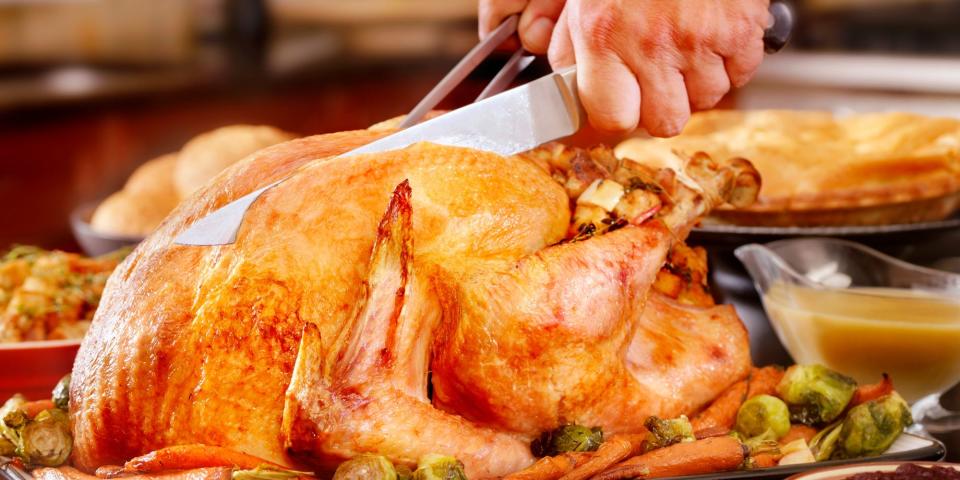Truths and myths about tryptophan — and why it's so healthy for you

Tryptophan is one of nine essential amino acids that's essential to a healthy diet and is found in foods like chicken, turkey, eggs, peanuts, and dairy.
Your body uses tryptophan to make melatonin and serotonin, both of which can make you feel drowsy.
However, feeling tired immediately after eating a large meal is not due to tryptophan — it takes about 5 hours for your body to produce serotonin after consuming tryptophan.
Although turkey is closely associated with tryptophan, it actually contains less tryptophan than chicken.
Tryptophan is a common scapegoat for Thanksgiving sleepiness due to its widely-reported presence in turkey. However, the compound is much more than a holiday punchline. It is essential to your good health year-round.
Tryptophan is one of nine essential amino acids — building blocks for proteins that the body needs to function properly, says David Cutler, MD, a family medicine physician at Providence Saint John's Health Center in Santa Monica, California.
"This means our bodies can't manufacture it from other substances so we must consume tryptophan to have it available for making proteins required for healthy bodily function," Cutler says.
Here's what you need to know about tryptophan and how it benefits your body.
How your body uses tryptophan
Your body uses tryptophan to make three important compounds:
Melatonin: A hormone that helps regulate the sleep-wake cycle.
Serotonin: A neurotransmitter that helps control mood and the onset of sleep.
Niacin: The liver utilizes tryptophan to make niacin (also known as vitamin B3), which helps regulate metabolism and keep cells healthy.
Tryptophan is particularly important for infants in order for their brains to develop a sleep-wake cycle.
There are two types of tryptophan compounds: L-tryptophan and D-tryptophan. Cutler says to think of them as mirror images of each other, just like your hands. The "l" and "d" stand for "levo" and "dextro," medical designations that have their roots in the Latin for "left" and "right."
"While the chemical composition is identical, this altered orientation can affect potency, metabolism, and body distribution," Cutler says. "L-tryptophan is broken down more slowly than D-tryptophan so it is the preferred form for supplementation." L-tryptophan is also the type found in most foods, including turkey.
Does tryptophan help you sleep?
Yes, tryptophan can help you sleep — but that sleepy feeling you get right after a large, heavy dinner is not due to tryptophan.
"The belief that tryptophan makes you sleepy is somewhat based in science and somewhat in myth," says Cutler.
"The science derives from the fact that tryptophan gets chemically altered in your body into serotonin, thus regulating the sleep/wake cycle," says Cutler.
"The myth seems based on the drowsiness many feel after a large Thanksgiving turkey meal," says Cutler.
It's much more likely that your feeling of sleepiness after a large meal is linked to overeating. It takes a lot of energy for your body to process that much food.
When you eat a food containing tryptophan and niacin, your body's metabolism breaks it down into serotonin, which can help you feel drowsy. However, that process of producing serotonin takes about 5 hours after eating. So don't blame tryptophan for your sleepiness right after a big holiday meal.
Foods with tryptophan
Although turkey is closely associated with tryptophan, it actually contains less tryptophan than chicken.
In fact, Cutler says that most people are constantly consuming tryptophan through foods including:
Poultry, like turkey and chicken
Eggs
Peanuts
Dairy, like milk
Soy, like soy milk and beans
Benefits of tryptophan
There's a lot that still needs to be learned about tryptophan. Scientists know that it's important for everyone, especially infants, for whom it can help regulate sleep.
"An average, varied diet should include adequate tryptophan to supply the body's basic needs," Cutler says. Here's what scientists have found so far regarding tryptophan's health benefits:
Scientists are studying whether tryptophan supplements can be used to treat mental illnesses including depression and anxiety, and they've found that tryptophan supplements may improve attention and memory.
Depression, in particular, is associated with low levels of serotonin. A small 2014 study put 25 healthy young adults on either a high tryptophan or low tryptophan diet for four days, switching to the alternate diet after a two-week period; after eating more tryptophan, they had lower symptoms of depression and anxiety.
Still, Culter cautions that scientists don't fully understand the impact of tryptophan and its possible benefits for mental health. "There is no FDA approval of tryptophan for any of these indications," he says.
Risks of too much tryptophan
In rare cases, consuming too much tryptophan through manufactured supplements has been associated with eosinophilia-myalgia syndrome (EMS) a disorder that affects the body's organs and can cause pain and weakness. In part because of this, l-tryptophan supplements were banned by the FDA from 1990 to 2005.
Although the supplements are for sale again and have not been linked to any new instances of EMS, they should be used with caution, especially since most people get all the tryptophan they need from their normal diet.
Insider's takeaway
Tryptophan is an important part of a healthy diet and one that most people consume plenty of without even trying.
Although it's tempting to blame your Thanksgiving sleepiness on tryptophan, a serving of turkey has less of this amino acid than a serving of chicken.
Tryptophan's main claim to fame is as an essential amino acid that's a building block helping keep your body running just as it should.
Related articles from Health Reference:
How melatonin can make you sleep better: What it is, how much to take, and the health benefits
Why am I always tired? The main causes of sleepiness and fatigue
Read the original article on Insider
